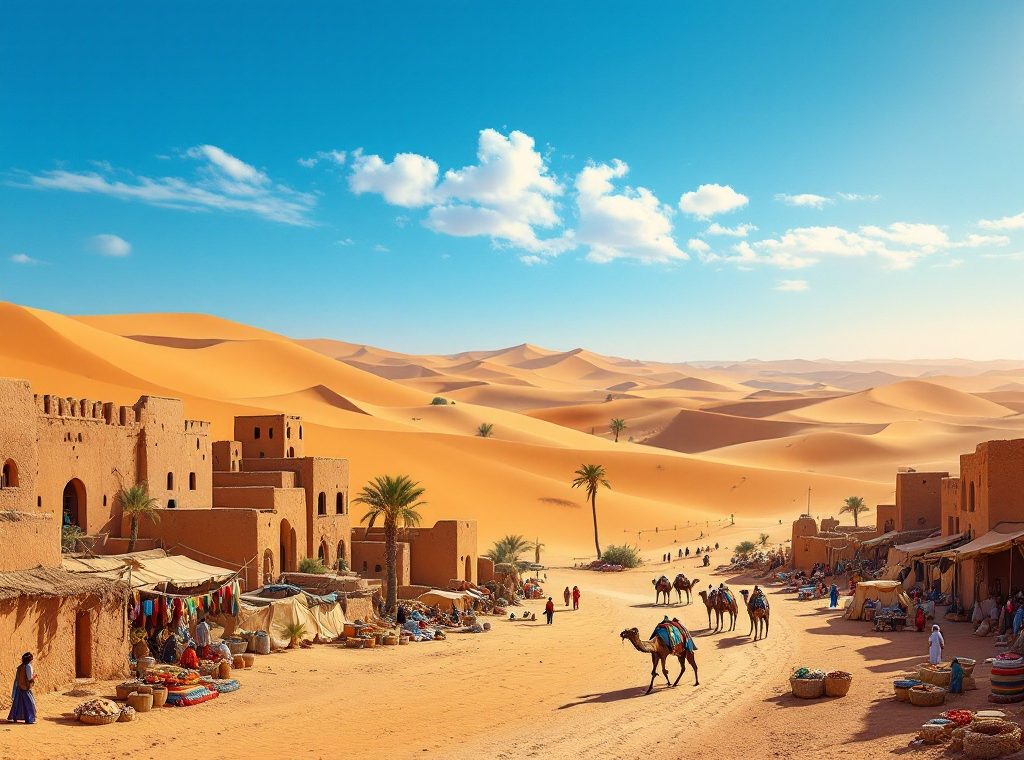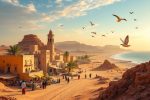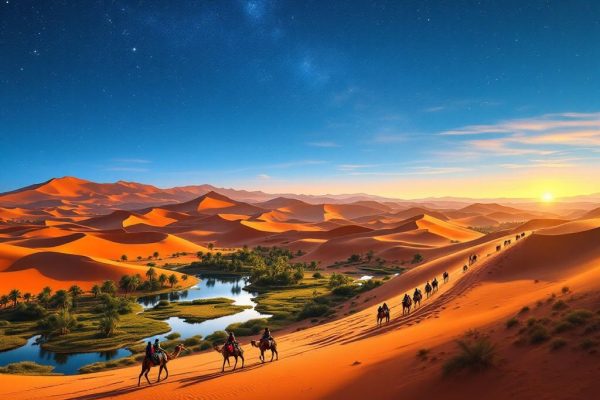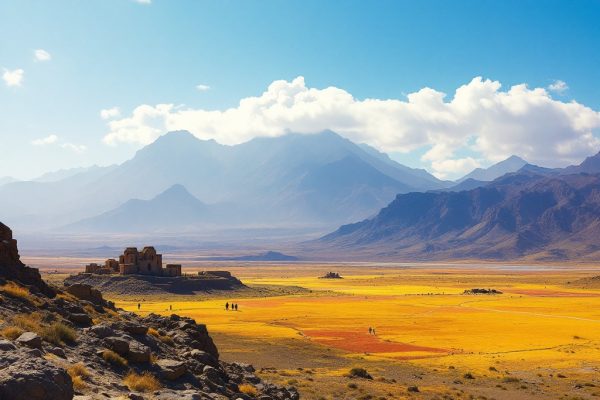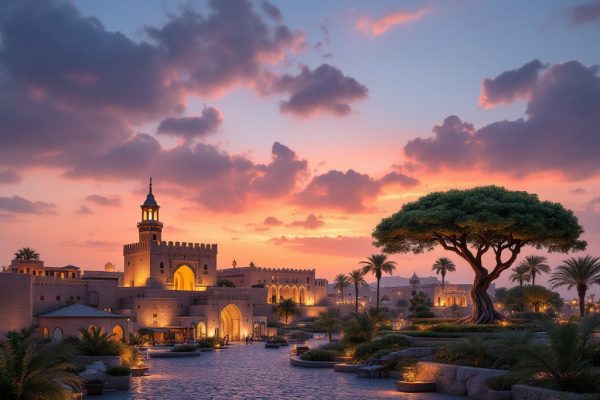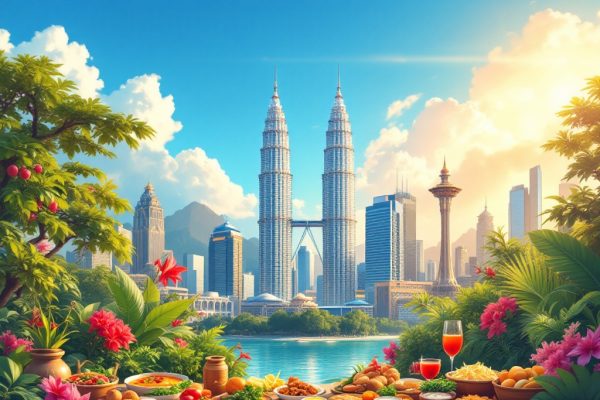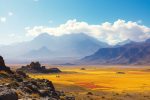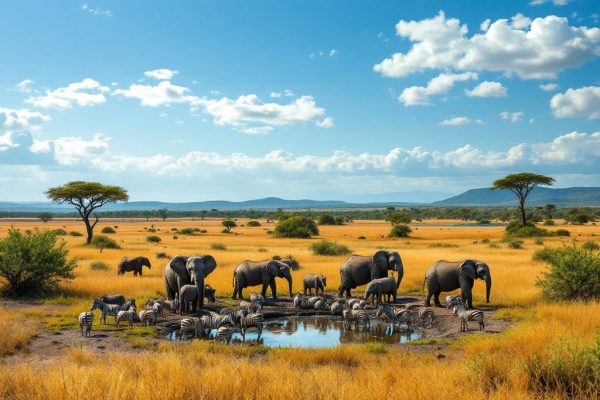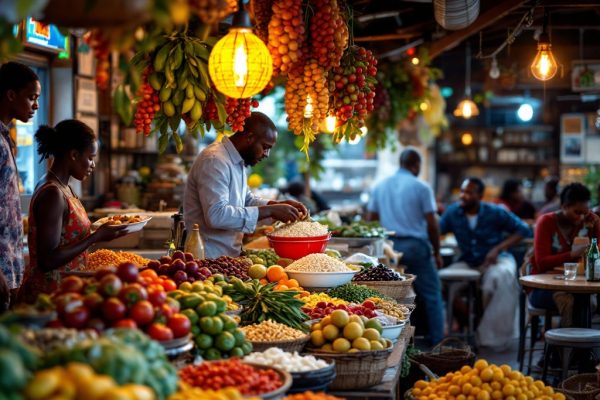A Short Guide How to Spend Holidays in Mauritania
Dreaming of an exotic adventure? Discover Mauritania, a land of ancient cities and vast desert landscapes. Explore the Sahara on camelback, uncover historical treasures in Chinguetti and Ouadane, and witness vibrant nomadic cultures. From birdwatching in the Banc d’Arguin National Park to savoring traditional cuisine, Mauritania offers a unique travel experience. Plan your trip now and prepare to be captivated!
Important information
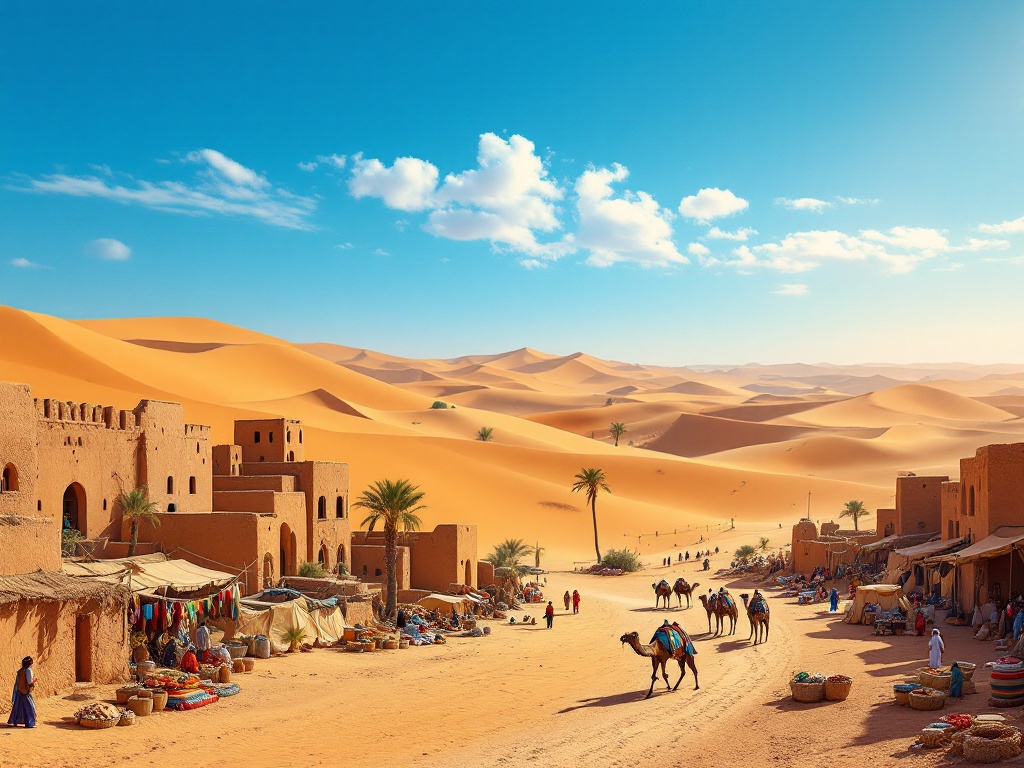
- The best time to visit Mauritania is during the cooler months from November to March (20-25°C).
- A visa is required for most nationalities, obtainable on arrival at Nouakchott Airport (NKC) or from an embassy.
- Safety precautions are necessary: drink bottled water, be aware of petty theft, and check travel advisories.
- Key attractions include the Sahara Desert, Banc d’Arguin National Park, ancient cities of Chinguetti and Ouadane, and the Terjit Oasis.
- Experience nomadic culture through homestays and guided tours.
Introduction to Spending Holidays in Mauritania
Experience an unforgettable Mauritanian adventure. Explore vast desert landscapes and ancient cities. Immerse yourself in the vibrant nomadic culture, trekking through the Sahara Desert on camelback. Discover historical treasures in Chinguetti and Ouadane, where Mauritania’s rich history and unique architecture are revealed. Birdwatchers will find paradise in the Banc d’Arguin National Park, teeming with diverse avian species. Experience the warmth of Mauritanian hospitality by interacting with local communities. Discover the country’s captivating culture expressed through traditional music, dance, and unique cuisine.
Practical Travel Information
Tourist options in Mauritania are limited, and accommodations are basic. For a truly immersive cultural experience, consider a homestay with a local family. This offers a unique perspective and may involve sleeping on the floor or in a courtyard.
Visa Process and Travel Permits
Traveling to Mauritania requires a visa for most nationalities. You can easily get a visa upon arrival at Nouakchott–Oumtounsy International Airport (NKC). Another option is to obtain your visa beforehand through a Mauritanian embassy or consulate. Travel permits may be required for specific areas, including border regions and desert areas. Check travel advisories and confirm any permit requirements with Mauritanian authorities or your local embassy before you travel to ensure a hassle-free trip.
Best Time to Visit Mauritania
Plan your Mauritanian adventure between November and March for the ideal experience. Enjoy comfortable temperatures ranging from 20°C to 25°C (68°F to 77°F), perfect for exploring the Sahara Desert and the captivating coastal regions. Summer (June to August) brings scorching heat, often exceeding 40°C (104°F), so plan accordingly.
Health and Safety Precautions
In Mauritania, stick to bottled water to stay safely hydrated. Avoid tap water as it’s not safe for drinking.
Travel Safety and Security in Mauritania
Mauritania is generally a safe destination for travelers, as the government actively maintains security in tourist areas. However, petty theft can occur, like in other tourist spots. Take standard precautions such as avoiding flashy jewelry and carrying large amounts of cash. Be mindful of your belongings, especially in crowded areas. Consult your government’s travel guidelines before and during your trip to stay informed about any specific safety concerns or advisories.
Is Mauritania Safe for Tourists?
Traveling in Mauritania requires vigilance due to the complex security situation. While the government has implemented safety measures, particularly in tourist hubs, remaining informed about potential risks is crucial. Research your destinations thoroughly and heed government advisories for a safer journey.
Understanding the Security Situation
Mauritania presents certain safety challenges, including terrorism and crime. Although rare, kidnappings do occur. Petty theft is common, especially in urban areas, so protect your valuables. The border with Mali is particularly dangerous. Exercise caution and be mindful of your surroundings. Avoid walking alone at night and keep valuables out of sight. Stay updated on current events. Here’s how to enhance your safety:
Be aware of your surroundings at all times. This includes being aware of who is around you and what is happening around you.
Avoid walking alone, especially at night. If you must walk alone, be sure to stay in well-lit areas and let someone know where you are going.
Keep your valuables out of sight. Do not carry large amounts of cash or wear expensive jewelry. If you are carrying a bag, be sure to keep it close to you at all times.
Be cautious of strangers. Do not talk to strangers or accept anything from them. If someone approaches you and makes you feel uncomfortable, walk away.
Stay informed about current events. Be aware of any potential threats or dangers in the area. You can do this by reading the news or checking travel advisories.
Exploring Mauritania’s Unique Landscapes
Embark on an unforgettable adventure trekking through Mauritania’s Sahara Desert by camel, camping under a breathtaking canopy of stars. Birdwatchers will find paradise at the Banc d’Arguin National Park, a UNESCO World Heritage site teeming with diverse avian species and unique coastal ecosystems. Escape the desert’s scorching heat at the Terjit Oasis, where palm trees and a small waterfall offer a refreshing respite from the arid landscape.
The Sahara Desert Experience
Experience the magic of the Sahara Desert. Trek across vast dunes on a camel and camp under a starlit sky. Explore ancient caravan routes and discover bustling traditional markets. For the adventurous, experience the thrill of sandboarding or conquer towering dunes in a 4×4. Immerse yourself in the rich Saharan culture. Visit nomadic tribes and experience their unique customs, and enjoy the rhythm of local music and dance. The Sahara Desert: where adventure meets cultural discovery.
Banc d’Arguin National Park: A Birdwatcher’s Paradise
Birdwatchers flock to the world-renowned Banc d’Arguin National Park, a sanctuary where birds thrive.
Discovering Terjit Oasis
Escape the Adrar desert’s scorching heat at the refreshing Terjit Oasis. This desert spring is a popular tourist destination.
Historic and Cultural Highlights
Chinguetti, a UNESCO World Heritage site, is renowned for its libraries, which house ancient Islamic manuscripts. The city’s architecture is a distinctive blend of traditional and Islamic styles.
Ouadane, another ancient city, boasts remarkable architecture and was once a crucial caravan trading hub. Its old town is a labyrinth of narrow streets and traditional stone houses.
Atar serves as a key gateway to Mauritania’s historical sites, including Chinguetti and Ouadane. This city provides essential resources and transportation for travelers exploring the region.
Visiting the Ancient City of Chinguetti
Chinguetti, a UNESCO World Heritage site, is renowned for its historic libraries containing ancient Islamic manuscripts. The city’s remarkable architecture showcases traditional Saharan building methods. Visitors can explore the stunning beauty of the surrounding desert landscape.
Exploring the Historic Town of Ouadane
Nestled in the heart of Mauritania, the historic town of Ouadane stands as a testament to time and a UNESCO World Heritage site. Famous for its stark desert landscape and remarkably preserved architecture, Ouadane once thrived as a vital hub for trans-Saharan trade. Its significant influence on regional development has made it a focal point of extensive research.
The Importance of Atar: Gateway to Historical Sites
Atar unveils Mauritania’s captivating history and is a perfect starting point for exploration. Discover Mauritania’s rich heritage with trips to the ancient cities of Chinguetti and Ouadane.
Experiencing Local Life and Culture
Experience Mauritania’s rich nomadic culture. Many Mauritanians maintain a nomadic or semi-nomadic lifestyle, traveling the desert with their herds and preserving a unique cultural heritage. Take guided tours and engage in homestays to witness traditional crafts, music, storytelling, and the significance of camels in their society.
Experience Mauritanian Hospitality
Mauritanians are known for their warm hospitality and welcoming nature. Engage with locals to experience their generosity firsthand.
- Share a meal with a family,
- attend a local event,
- or chat with people in markets and villages to gain insights into daily life.
Respect Their Culture
Learning basic Arabic phrases can enhance communication and show respect for Mauritanian culture. It will enrich your travel experience and create meaningful connections with the local people.
Nomadic Culture and Traditions
Mauritania’s nomadic Moors possess a rich cultural heritage deeply intertwined with camel herding. These tribes traverse the desert in search of pasture, dwelling in mobile tents. Their diet consists mainly of milk and dates, occasionally supplemented with meat. Family and tribal bonds form the bedrock of their social organization. Oral traditions, poetry, and music preserve their history.
Interacting with Hospitable Locals
Respecting local customs will greatly enhance your travel experience in Mauritania. Mauritanians are known for their warm hospitality, and engaging respectfully with locals will enrich your travels. Learning basic Arabic greetings demonstrates cultural sensitivity. Dress modestly, especially when visiting rural areas. Always request permission before photographing people. Accepting offers of tea or food is considered a sign of respect. Bargaining is customary in markets, but remember to be polite. A simple “thank you” can make a big difference.
Traveling Around Mauritania
Traveling within Mauritania’s cities offers a few options. Public transport, such as buses and bush taxis (shared taxis), is readily available and often the most affordable choice. For example, the Nouakchott-Atar route takes approximately six hours by bush taxi.To explore remote areas, private transport is recommended. Hiring a car and driver, ideally a 4×4 due to the rough terrain, is advisable. A local guide can enhance navigation and cultural immersion.For traveling longer distances between major cities, domestic flights offer a quicker alternative.
Public Transport and Travel Options
Traveling around Mauritania offers a few options.
Bush taxis, shared rides connecting various towns and cities, are common and frequent, but can be uncomfortable.
For travel between major cities, long-distance buses provide a more structured, though less frequent, service.
Renting a car offers flexibility for exploring at your own pace, but road conditions, particularly outside major cities, can be challenging.
Consider hiring a driver and a local guide.
For longer journeys, domestic flights, such as the one between Nouakchott and Nouadhibou, can save considerable travel time.
The Iron Ore Train: Longest Train Journey
Known as the “Train du Desert,” the Mauritania Railway operates the world’s longest train, spanning over two kilometers. Its main purpose is transporting iron ore from the Zouérat mines to the port of Nouadhibou. This massive train also provides passengers with a unique and unforgettable journey through the Sahara.
Accommodations and Hospitality
Mauritania offers diverse accommodation options for travelers. Experience local life with a family homestay, or immerse yourself in the culture at a traditional guesthouse. For an unforgettable adventure, camp under the breathtaking Saharan stars. If you prefer a more conventional stay, consider hotels such as the Auberge Sahara in Nouadhibou or the Terjit Vacances in the Terjit Oasis.
Local Accommodation Options
Looking for accommodation in Mauritania? Here are some options:
Nouakchott
Consider Auberge Sahara, offering both private rooms and dorm beds.
Atar
Check out the conveniently located Hotel Tfeila near popular attractions.
Chinguetti
Experience history at Auberge du Ksar, located within the old city walls.
Adventure Stays
Camp in Banc d’Arguin National Park or the Sahara Desert, often arranged through local tour operators.
Camping and Desert Stays
Experience the wonder of camping beneath the Sahara Desert’s starlit sky. You have several options: enjoy the convenience of an organized desert camp, providing tents, bedding, and meals, or embrace a self-sufficient independent adventure. For a truly immersive cultural exchange, consider staying with nomadic families, experiencing their rich culture and warm hospitality firsthand. Always remember to honor and respect local customs.
Mauritanian Cuisine: A Taste of Tradition
Experience the rich culinary tapestry of Mauritania. Indulge in thieboudienne, a flavorful fish and rice dish simmered with vegetables and a tangy tomato sauce. For a more substantial meal, savor mechoui, slow-roasted lamb infused with aromatic spices, often served during festive occasions. Couscous, a staple of Mauritanian cuisine, is commonly accompanied by hearty meat and vegetable stews. As a refreshing contrast, try mechouia, a grilled vegetable salad. Complete your culinary journey with biban, a sweet treat made from date paste and flour. Explore Nouakchott’s diverse street food scene to sample local snacks and sweets.
Traditional Meals and Local Cuisine
Mauritanian cuisine offers a rich tapestry of flavors, centered around rice, millet, and meats like lamb and chicken. These dishes are often enhanced with aromatic spices and flavorful sauces, creating a unique culinary experience. A quintessential example is thieboudienne, a cherished fish and rice dish. The communal nature of meals, shared and enjoyed together, reflects a core value of Mauritanian culture. Beyond these staples, tagines, slow-cooked stews brimming with vegetables and dried fruits, add another dimension to the country’s cuisine.
Dining in Nouakchott and Beyond
Nouakchott offers diverse dining experiences, from local favorites to global cuisine. Sampling traditional Mauritanian dishes is essential. Outside the capital, meals become simpler, focusing on regional flavors. Coastal areas offer fresh seafood. Grilled meats and tagines are also common.

